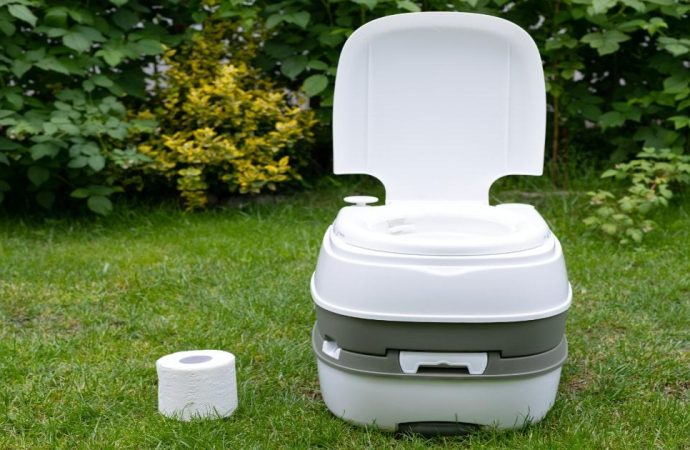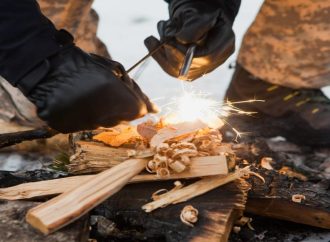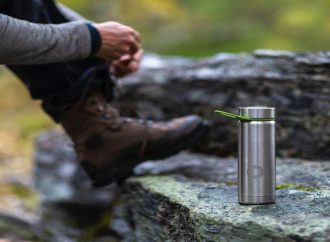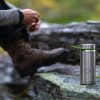Everyone produces waste, that’s just a fact of life, and despite the differences between the normal world we enjoy today and the post-SHTF one, everyone will still have to cope with this element of life on a daily basis. Whether bugging in or bugging out, it’s essential that you know how to deal with human
Everyone produces waste, that’s just a fact of life, and despite the differences between the normal world we enjoy today and the post-SHTF one, everyone will still have to cope with this element of life on a daily basis.
Whether bugging in or bugging out, it’s essential that you know how to deal with human waste and what to do in each situation. It will be more important than ever that you deal with your waste properly when the world goes to pot, and how to clean yourself after too.
Preparing For A World Without Toilets
Hygiene and health risks from not dealing with waste products exist in the world system we live in today, especially in developing countries, but in the aftermath of a disaster it’s highly likely developed nations such as the UK and the USA will mirror third world nations when it comes to the sanitation system.
Toilet cisterns won’t fill up properly without power, and entire sewer systems will soon get clogged with nobody to man the dirty jobs at waste processing plants we take for granted today which keep our sanitation levels high. You should have a plan of how to deal with human waste whether it is on an individual basis or you have family.
It’s estimated that over four billion people in this day and age still live day to day without proper sanitation such as access to toilets in their own homes, and poor sanitation causes hundreds of thousands of deaths every year.
There are countless number of diseases and infections you could fall victim to in a post-collapse world given the volatile environment around you, and the number one rule of being a prepper is to know the basics of what to do to handle any situation that comes your way, including maintaining proper levels of hygiene and sanitation.
You don’t want to be the maker of your own demise by having yourself or your group fall ill due to lack of proper waste disposal, so here we’ll examine the many ways you can stay on top of the situation.
The Importance Of Disposing Properly
There’s a huge number of diseases that can be caught from faeces if you haven’t put a system in place with how to deal with human waste properly, and their risks are all heightened in a disaster scenario. Just a handful of the diseases you can fall ill from just by not maintaining proper hygiene include:
- Polio – causes vomiting, muscle weakness, limb paralysis and breathing problems
- Typhoid – causes headaches, confusion, full body rash, hypotension and shock
- Cholera – causes diarrhoea, cramps, rapid heart rate and vomiting
- Hepatitis – causes abdominal pains, high fever, joint pain, jaundice and fatigue
- Dysentery – causes stomach cramping, profuse diarrhoea and a painful swollen liver
None of these are simply minor health risks, and they should all be treated as dangerous and life-threatening.
In addition to the effects themselves, the danger is heightened for those who are bugging in due to their close proximity to family members or others in their group, where illnesses can spread quickly in close quarters.
Any one of these diseases would wreak havoc on your careful prepping, and could spell disaster even if you have enough food, weapons and a perfect shelter. What’s more, your GP surgery isn’t going to be open and nobody is coming to your aid from a 999 call.
Flushing The Toilet
If you’re bugging in, you should not attempt to use the toilet as normal if the power is off and you are in the middle of a SHTF event. When infrastructure’s down and plumbers are unavailable, this is essentially creating a biohazard in the middle of your home.
Yes, the toilet is mentally the place you want to go to relieve yourself, but fight temptation and don’t use it as you normally would unless the power is on. If you don’t plan on staying there long term, you may get away with simply using the toilet and then flushing it by pouring a bucket of water on top of it.
What are you going to do if the whole system backs up as you, and thousands of others in the area, have used it when you shouldn’t have and now your entire bug in location is compromised with overflowing foul-smelling, toxic water and no plumber to call?
Learning how to deal with human waste should be a key issue for preppers even if you think you should be more focused on food storage. But remember, all that food you eat and expel has to go somewhere!
After the toilet, the bath is the next most attempted try at removing waste from the property – once again, don’t do it.
If you’re fortunate enough to have access to water, you can simply use it to swill away the waste in a location far from the property, creating a strong substitute to a working toilet. Otherwise, do not ruin your safe, hygienic location, wherever you’ve chosen to bug in.
To keep you psychologically in the right place, you can still use the toilet as you normally would for number twos, but just line it with a regular carrier bag or an XL doggy bag with handles pinned under the seat and then dispose of it elsewhere.
If you just need a pee, then it’s a no-brainer as a man to just walk a good distance from your house and do it on the ground. Women, you might want to do the same but bring a lookout for you.
You can make your own toilet by lining a large toilet bucket with a plastic bag, leave it empty if you’re just going to swill it out, or throw some sawdust or cat litter to cover it.
It’s always a good idea to separate your number ones and number twos for obvious reasons. To make a seat to sit on you can use a foam pool toy bent into shape, or just break a regular toilet seat off and repurpose it. Or, you can just buy a portable toilet stand to have in your preps for ease and comfort.
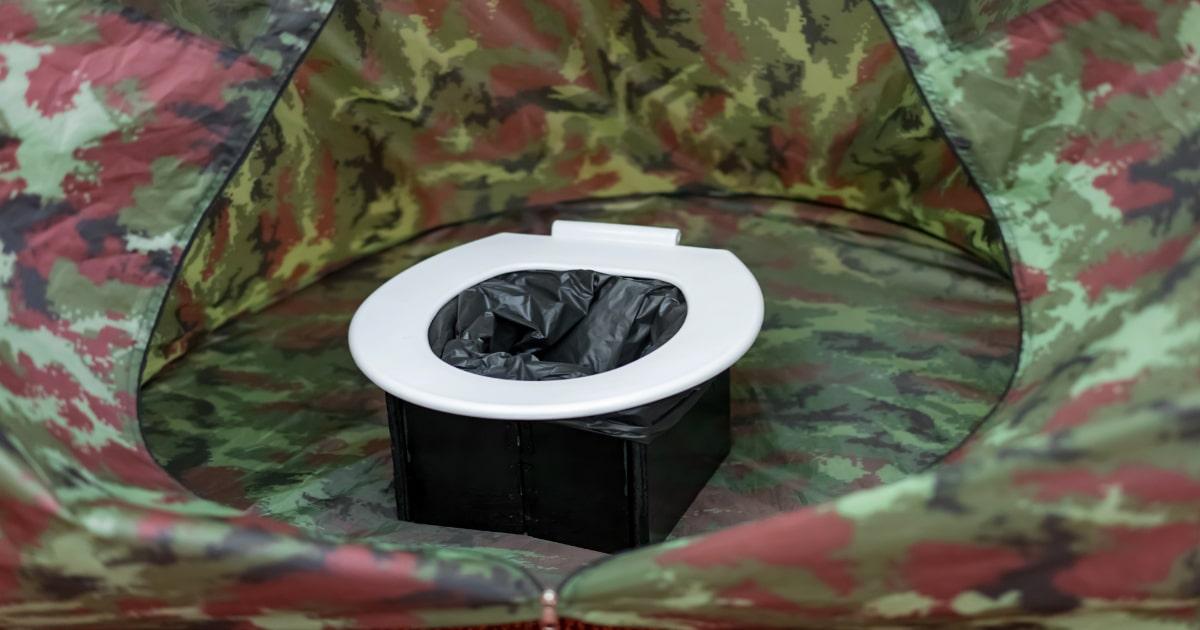
On-The-Go Toileting
If you’re bugging out, one of the simplest methods is to simply use nature as your bathroom, squatting near a bush, rock or tree for some cover and then move on. There’s no guilt attached, and no harm to wherever you’re staying.
One very small risk is that it can be used for tracking if people are looking for you it’s a very clear signal you were there. You may want to revert to a burial.
However, the elements should take care of this in due time if you’re not being tracked, or a quick action as simple as kicking dirt onto your waste can completely eliminate this risk.
Chemical Toilet
In much the same way as caravan and motorhome owners use to go to the bathroom, you can create your own chemical toilet.
You can buy a camping toilet online which has a seat and a base, and huge bottles of pink and blue specialist chemical solutions you can purchase that will last you for a long time if you have to bug in and stay bugged in for a number of weeks, such as in the event of a nuclear strike.
Some of the chemicals will neutralise the smell, and others will act to break it down. Simply let the box fill up and tip it outside a distance from where you’re staying, or if you have a few big barrel drums, you can just empty it into there and secure the lid to hold a lot of waste.
These chemical formulations are normally biological and are created with nitrates, biocides and ethanol instead of harsh bleaches.
Septic Tank
If you’ve already got a place off-grid then you can quite easily have a septic tank installed which will hold a great deal of waste.
Requiring minimal maintenance and only needing to be emptied every few years, one or two septic tanks or a very large on can keep you going for a long time and maintain a high level of sanitation.
Remember that how long a septic tank lasts depends on how many people are using it day to day – a small family will get much longer use out of it than a small community of preppers living off-grid.
Create A Pee Bale
If you’re looking to get the most out of your urine, then peeing directly on to a straw or hay bale is a great way to create a nitrogen rich style of compost.
You can add water or campfire ash to the bale also as a way of making it more adapted for fertilising plants, as urine on its own can harm growing seedlings due to the high salt content and ammonia which can burn plants.
After a few weeks or months of using the pee bale, take a pitchfork and aerate it, then you can cover it with soil and leave it to break down naturally.
A commercial version of this is called a l’uritonnoir where funnels are directed into the bale and multiple people could use them, becoming nitrogen compost in as little as six months.
Dig A Latrine
Similar to a toilet, a latrine is basically an open hole in the ground you poop into and is used by millions all over the world. It can be just a couple of feet deep, or it can go metres down.
Ensure that the bottom of the latrine has direct contact with the soil and you can put some powdered lime on top of your deposit to prevent smells. Sawdust also works equally as well.
Watch children around latrines as if the hole is big enough they could fall in. When the latrine is full, mark its location and move to a new area.
An alternative to a fully dug out latrine is a latrine trench about 8 inches deep and 8 inches wide. You can use it bit by bit, working your way along the length from one end, covering as you go with the soil you’ve dug out placed behind it.
Burial
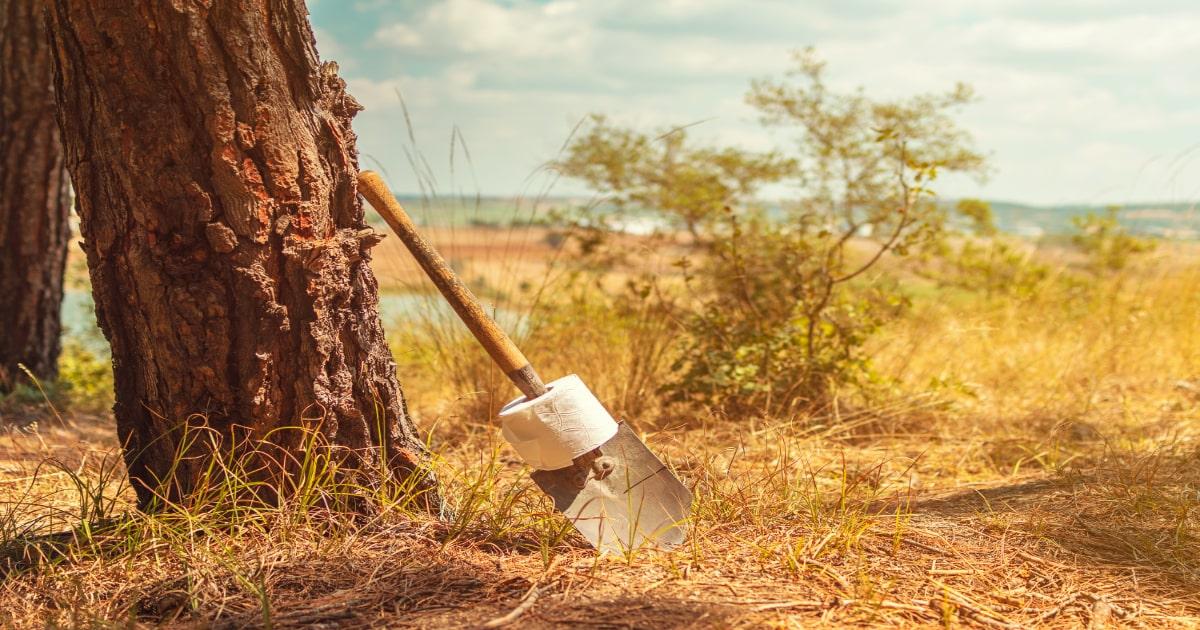
This is the easiest and probably your first considered method of getting rid of waste. If you’re wondering how to deal with human waste the simplest way possible, then it’s a case of ‘out of sight, out of mind’.
If you have a bug in location then you can head to a location a good distance from your camp, take a survival shovel with you and make your deposit back to the earth, also known as a cathole.
Probably mark it with something on top like a rock or an upright stick so nobody ends up digging in the same place.
One disadvantage is actually digging the hole each time, especially if you really need to go, but with the right equipment, this shouldn’t be an issue and a standard survival shovel will do the job nicely. You can even dig a few holes at a time.
We don’t recommend doing this in your garden for those bugging in, as it can turn your immediate environment into a minefield of places you won’t want to step, unless you choose to do one large family-sized hole for multiple deposits somewhere inconspicuous.
Stream Flushing
Whilst it’s not good for anybody living downstream from you, if you have a location next to a river or stream then you can set up something that deposits your waste straight into the river.
There will be no leftover mess and the river carries it away and breaks it down. Make sure that you are able to get the waste into a fast-flowing part of the river so it doesn’t sit stagnant which can pose a health risk.
If you have young children or elderly with you, it’s probably best you accompany them to ensure that they don’t accidentally fall into the river when going to the toilet.
Another way to do this is to have a small bucket you can fill with water from the river, place a seat on it to do your business, and when you’re done simply tip it into the river and swill out. Or, simply place your portable toilet stand in the river itself, then water bidet yourself to clean with river water.
Of course, always make sure you get your drinking and washing water from upstream and deposit your waste further downstream to avoid any contamination.
Don’t do your business in a plastic bag and then throw it in the river, as it’s likely to pile up downstream and leave a mark to your location if anyone comes across it, and pollute the environment of course.
Build A Dedicated Humanure Composting Toilet
In the normal world, composting manure is best left to farmers and allotment holders. But in a world that’s fallen victim to disaster, it can quickly become your best friend, and it’s not as gross as you’d think.
Humanure composting is loosely described as recycling your own waste for agricultural purposes, and this isn’t just beneficial for hygiene reasons, but it also provides a strong foundation for your food to be produced when living off-grid.
Aerobic decomposition takes place, and works alongside insects, fungi and other undesirable lifeforms to reduce your waste down to a form of soil which can then be used to fertilise your crops.
If possible, mix it with other materials like straw and grass which can both be easily found, especially for those bugging out and you’re good-to-go. Leave the mixture for as long as possible to ensure that any nasty bacteria and pathogens are not still present when you begin to use it.
For those who don’t have the time to dig every time nature calls, a composting toilet could be the ideal solution. In short, you’re creating an outhouse like the days of old. This is perfect for keeping any biological risks away from yourself or those you’re with, but it does come with some negatives.
You’ll have to go outside in all weathers, meaning a cold, wet trip is guaranteed at some point. As you’re leaving the safety of your bug in location, there is a risk of encountering other people when you are at your most vulnerable.
There is also the downside of this permanent outhouse fixture acting as evidence that you’re nearby, so it may be expected that a threat may be waiting for you when your pants are around your ankles.
All you need to do is create a large and deep hole with your survival spade, with some form of opaque pop-up shelter around you. You can just use your portable toilet stand inside the tent.
Have something like leaves, cat litter or sawdust in a bucket next to the toilet so you can cover it after you’ve used it, neutralising any bad smells. Once a hole is full, simply cover and leave to turn into soil. Move the toilet a couple of metres to the right or left and start again.
Check Out The Joseph Jenkins Humanure Method
Perhaps the most famous of all the processes, Jenkins completed his thesis on this topic for a Master’s degree in Sustainable Systems. This excellent approach doesn’t just remove your waste – it also transforms it into plant food.
Joseph Jenkins is regarded as the founding father of alternative waste processes, and he is the guy to study if you want an assortment of diverse approaches to take.
Jenkins and his team had one goal – to make the human waste process cyclical, and even flew to Haiti to install sustainable waste systems.
You can find out more in the Jenkins Humanure Handbook.
Nappies & Nappy Sacks
If you’ve got young children and have to bug in, then using nappies for adults too is also a great alternative as they can be folded up and disposed of as a single package when use. We’re not saying you have to actually wear them as intended though, just do your business into them then wrap up and discard.
They’re also ideal for urinating into if you are unable to leave the property, as they are highly absorbent and can be stored in a thick plastic bag when used.
Or, you could deposit them into fragranced nappy sacks. A handy bulk buy of wet wipes will come as a welcome gift too if you’re wondering what to do should you run out of loo roll.
There is also a specially designed nappy bin which can accept a used nappy at the top, you spin the lid and it wraps it and drops it inside, and some can hold up to 40 nappies before they need to be emptied – perfect for an extended bug in situation.
Some have antibacterial and biocide properties and can kill nasty germs such as Staphylococcus Aureus and even E-coli.
The downside is that the area inside of a baby’s nappy is not that great unless you are using the biggest size possible, and they’ll also be quite expensive too at an average of 10p per nappy.
However, one pack of 30 cheap nappies costs around £2.70, and if you are using one per day that will last one person one month. So for a family of 4 you’ll only be looking at around £10.
Obviously aim to buy the biggest size possible, adult diapers cost more but are still good to have in a bind, even if it just lasts you the first few weeks of a disaster.
Summary
Overall, learning how to deal with human waste disposal in a disaster situation is a very manageable situation for a prepper provided you have a clear idea of how it’s going to be done and that you buy the supplies in advance of a SHTF situation, otherwise you’re going to have to improvise in this vital area of sanitation.
It’s also a guarantee that you will need to consider this aspect of survival so get used to it. There’s no one-size-fits-all approach due to a huge number of factors including whether you’re bugging in or out, the environment around you, and the readily available facilities you’ve been given.
It’s worth exploring all your options and mastering a number of them just to be on the safe side, even if it’s just buying a cheap portable bucket toilet or foldable toilet stand that can be used with regular carrier bags and putting it out of the way until you need it.
As our readers know, disaster situations are unpredictable, so we recommend getting to grips with both bugging in and bugging out solutions of how to deal with human waste so you’re ready for anything.
Always remember to keep your food preparation area away from where you use the bathroom, and always have some antibacterial gel or running water and antibacterial soap available – maintaining your hygiene is even more important after SHTF.
For long-term solutions, like building an outhouse, it’s essential to consider all the pros and cons. In this instance, you have the most civilised solution, but you’re also showing your presence to a countless number of unknown people, so weight up the benefits of your chosen technique.

